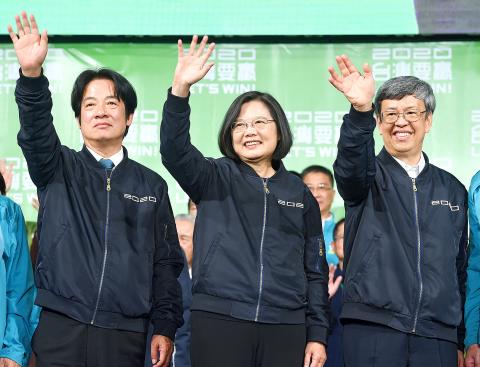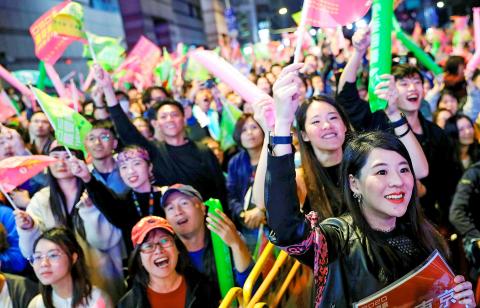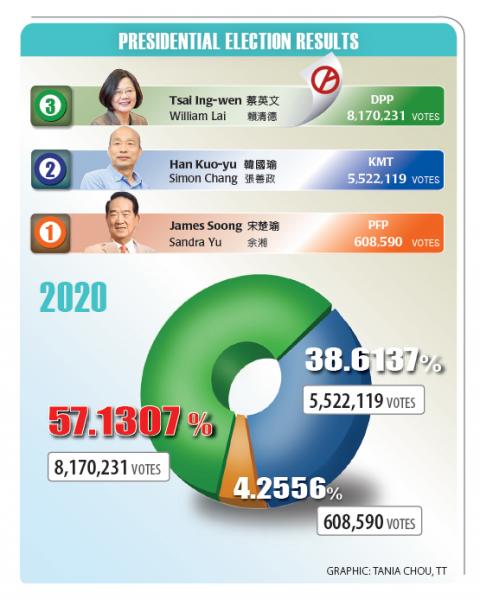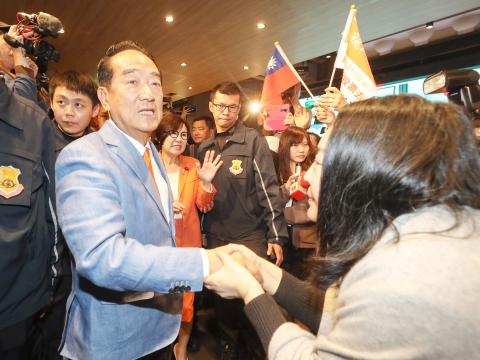President Tsai Ing-wen (蔡英文) of the Democratic Progressive Party (DPP) triumphed in the presidential election yesterday, crushing the Chinese Nationalist Party’s (KMT) hopes for a return to power by taking 57.1 percent of the vote.
Tsai secured a second term in office in a landslide victory against the rival tickets of Kaohsiung Mayor Han Kuo-yu (韓國瑜), the KMT’s presidential candidate, and his vice presidential candidate, former premier Simon Chang (張善政); and People First Party (PFP) Chairman James Soong (宋楚瑜) and his vice presidential candidate, former United Communications Group chairwoman Sandra Yu (余湘).
Voting took place between 8am and 4pm at 17,226 polling stations nationwide.

Photo: Chien Jung-fong, Taipei Times
The ticket of Tsai and her running mate, former premier William Lai (賴清德), won 8,170,231 votes, or 57.13 percent of the 19,311,105 registered voters, with the Han-Chang ticket garnering 5,522,119 votes (38.61 percent) and the Soong-Yu ticket receiving 608,590 votes (4.26 percent).
The total number of votes that Tsai received increased by 1,275,442 from 6,894,744 in 2016, when she received 56.1 percent of the total vote. It also surpassed the record of 7,659,014 votes that then-KMT presidential candidate Ma Ying-jeou (馬英九) received in the 2008 presidential election.
The votes for the KMT’s ticket yesterday increased by 1,708,754 from 3,813,365 in 2016, when it received 31.0 percent of the total vote.

Photo: Tyrone Siu, Reuters
In 2016, Soong garnered 1,576,861 votes, or 12.8 percent of the total vote.
In her victory speech, Tsai pledged “to do more and to do better” in her second term, adding: “We will not forget to engage in introspection just because of the [electoral] victory.”
Expressing gratitude to people who voted, she said that regardless of whom they voted for, “it is an implementation of democratic values.”

With every presidential election, Taiwanese tell the world that “we cherish the democratic way of life and cherish our country, the Republic of China (Taiwan),” she said.
She said she would listen to constructive criticism that Han and Soong have to offer.
Tsai said that her administration would continue to push for reforms, make progress with national construction projects, and close the income gap between rich and poor people.

Photo: CNA
She added that she would continue to keep the nation safe and protect its sovereignty.
“I also hope that Beijing understands that democratic Taiwan, and our democratically elected government, will not give in to threats and intimidation,” Tsai said.
Han conceded defeat last night, saying that Tsai had won a second term.
Han said that he had not tried hard enough and let his supporters down.
He asked people to remain calm, adding: “I have called President Tsai to congratulate her. She has a new mandate for the next four years.”
Han told supporters in Kaohsiung that he expects to see a united Taiwan, and that Tsai would lead the nation to a happier life.
Han, who took time off from his mayoral duties to campaign for the presidency, is to return to his Kaohsiung post tomorrow.
Soong also conceded defeat.
Expressing gratitude for the people who supported him, Soong said that he respected the decision of the nation, as the process is a reflection of Taiwan’s democratic values.
Soong said it was important that the government form a professional administration, and not resort to cronyism and nepotism, which would mar the civil service and negatively affect the public through reckless reforms.
Additional reporting by AFP and CNA

DAREDEVIL: Honnold said it had always been a dream of his to climb Taipei 101, while a Netflix producer said the skyscraper was ‘a real icon of this country’ US climber Alex Honnold yesterday took on Taiwan’s tallest building, becoming the first person to scale Taipei 101 without a rope, harness or safety net. Hundreds of spectators gathered at the base of the 101-story skyscraper to watch Honnold, 40, embark on his daredevil feat, which was also broadcast live on Netflix. Dressed in a red T-shirt and yellow custom-made climbing shoes, Honnold swiftly moved up the southeast face of the glass and steel building. At one point, he stepped onto a platform midway up to wave down at fans and onlookers who were taking photos. People watching from inside

A Vietnamese migrant worker yesterday won NT$12 million (US$379,627) on a Lunar New Year scratch card in Kaohsiung as part of Taiwan Lottery Co’s (台灣彩券) “NT$12 Million Grand Fortune” (1200萬大吉利) game. The man was the first top-prize winner of the new game launched on Jan. 6 to mark the Lunar New Year. Three Vietnamese migrant workers visited a Taiwan Lottery shop on Xinyue Street in Kaohsiung’s Gangshan District (崗山), a store representative said. The player bought multiple tickets and, after winning nothing, held the final lottery ticket in one hand and rubbed the store’s statue of the Maitreya Buddha’s belly with the other,

‘NATO-PLUS’: ‘Our strategic partners in the Indo-Pacific are facing increasing aggression by the Chinese Communist Party,’ US Representative Rob Wittman said The US House of Representatives on Monday released its version of the Consolidated Appropriations Act, which includes US$1.15 billion to support security cooperation with Taiwan. The omnibus act, covering US$1.2 trillion of spending, allocates US$1 billion for the Taiwan Security Cooperation Initiative, as well as US$150 million for the replacement of defense articles and reimbursement of defense services provided to Taiwan. The fund allocations were based on the US National Defense Authorization Act for fiscal 2026 that was passed by the US Congress last month and authorized up to US$1 billion to the US Defense Security Cooperation Agency in support of the

HIGH-TECH DEAL: Chipmakers that expand in the US would be able to import up to 2.5 times their new capacity with no extra tariffs during an approved construction period Taiwan aims to build a “democratic” high-tech supply chain with the US and form a strategic artificial intelligence (AI) partnership under the new tariffs deal it sealed with Washington last week, Taipei’s top negotiator in the talks said yesterday. US President Donald Trump has pushed Taiwan, a major producer of semiconductors which runs a large trade surplus with the US, to invest more in the US, specifically in chips that power AI. Under the terms of the long-negotiated deal, chipmakers such as Taiwan Semiconductor Manufacturing Co (TSMC, 台積電) that expand US production would incur a lower tariff on semiconductors or related manufacturing